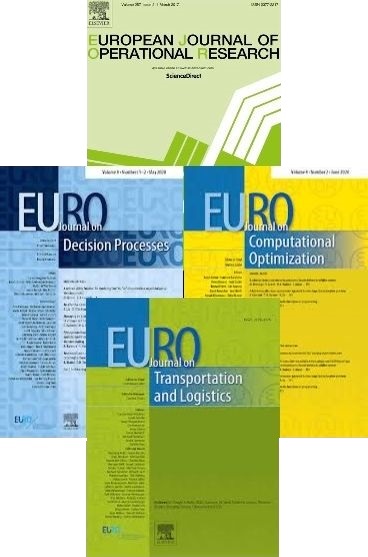EURO Award for the Best EJOR Paper (Guidelines)
Policy
Three awards for the best EJOR papers are presented annually provided there are candidates of sufficient merit. The recipients will be among the authors of papers published in EJOR in the eligibility period. The best survey paper, best application paper, and best theory/methodology paper will be selected by a jury.
Award
Each certificate will be presented at the following EURO-k or IFORS conference and the award of €1,000 will be transferred to the winner(s) shortly after that. There is no registration fee for one representative of each of the award winning papers.
Eligibility
The entries for the prize to award in year N will consist of papers published by EJOR in calendar years N-2 and N-3. Elsevier will provide all necessary information on papers published to enable the jury to determine a shortlist. The jury will go through those papers and select the winners.
Selection jury
The selection jury consists of five members of recognized stature in the OR community. One member will be a current EJOR editor. The jury includes a core of three members who serve normally a period of three prizes, with one member added at each prize edition. The new member is nominated by the EURO Executive Committee (suggestions will be asked to the jury core) and approved by the EURO Council. The chair is normally the member who is in the final year of service. The EURO EC then selects additionally two members serving only for the current prize edition and keeps the EURO Council informed about the decision. For each of the three best paper categories, members of the jury will be allocated relevant papers and they will submit their recommendations to the full jury.
Care should be taken to make sure that the selection committee is representative of the various areas of OR. In particular, it is important that no two members come from the same major research area in OR. The jury members must be members of one of the EURO member societies.
If any member of the award jury has a past or current relationship with a nominee that might influence the selection process for reasons other than the merits of the case relative to the award, it is the responsibility of each jury member to bring to the attention of the jury chair such a conflict of interest. The jury chair should propose a response that ensures that the final decision of the jury is exempt from any apparent conflict.
Selection process
Six months prior to the EURO-k/IFORS Conference, the jury will be sent all the relevant publication information by Elsevier. General criteria for the evaluation of the papers are:
- the scientific quality of the paper;
- the originality of the paper;
- the relevance to Operational Research.
In addition, papers will be evaluated according to the specific category of award they are being considered for (survey, application, theory/methodology).
Four months prior to the EURO-k/IFORS Conference the jury will select the winning paper for each of the three categories. Only one award will be made per category. The winning authors will be notified and a representative for each paper will be invited to attend the next EURO-k/IFORS Conference where the award will be presented.
Time Line for the EURO Award for the Best EJOR Paper
| t - 1 year | Nomination of the new EABEP jury core member by the Executive Committee. Approval of the new EABEP jury core member by the EURO Council. |
| t - 1 year | EJOR editor proposes name of EJOR representative on the jury. EURO Executive Committee to confirm. |
| t - 1 year | Selection of additional jury members by the EURO Executive Committee. |
| t - 1 year | EURO Executive Committee keeps EURO Council informed about the additional jury members. |
| t - 6 months | Elsevier send all relevant publication information to selection jury. |
| t - 4 months | Decision of the jury, the jury chair informs the EURO Office. The EURO Office contact the winners to inform them about the award and the presentation at the closing session and to make arrangements for their registration. |
| t | EURO-k/IFORS Conference: presentation of award. |

This work is licensed under a Creative Commons Attribution-ShareAlike 3.0 International License and the GNU Free Documentation License (unversioned, with no invariant sections, front-cover texts, or back-cover texts).
EURO-Online login
